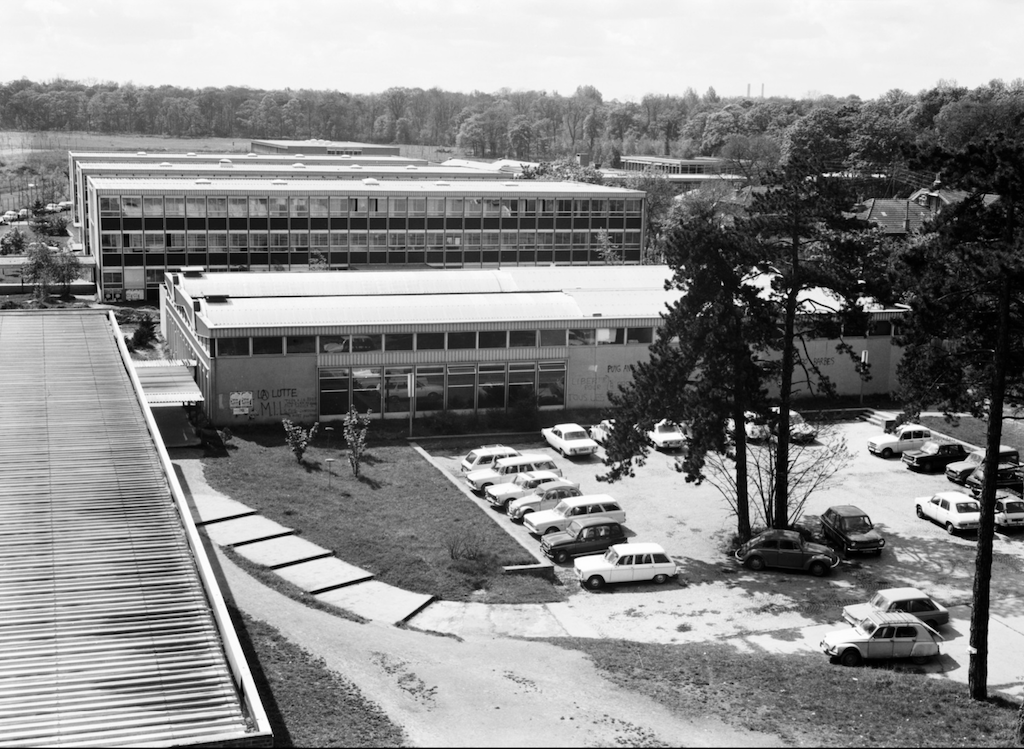Revolutionary impulses persisted when the Vincennes Philosophy Department opened its doors the following winter, housed in a brand-new, modern campus in a park just east of Paris. The new university responded to longstanding demands for educational modernization; it was also said to be convenient for the French government to put all the protesters safely outside the center of Paris.[9] “For most [students at Vincennes], it was about building a political university with the declared objective of setting off a revolution” (Dormoy-Rajramanan 2004:27). While some political groups, particularly the Maoists, were more overtly “revolutionary” than others, the trope of “the revolution” was nobody’s possession. Rather, “the process of revolutionary subjectivation had been opened up, made available to any collectivity” (Ross 2002:125). This included professors as well as students. As Alain Badiou recollected, to get hired at Vincennes, “it was obviously required to have been engaged in 68… in reality we were pretty much all political activists when we got there” (Dormoy-Rajramanan 2004:138).

This revolutionary immediacy did not last, as far as we can tell from the male professors’ testimonials which dominate the archive of the period. Bensaïd, who became a leader of the May protests, described a period of initial chaos on campus.
I was a part-time worker at Vincennes in fact, at least until 72. I didn’t show up scrupulously for the most turbulant moments, the ones that were somewhat frenzied [qui avaient un côté délirant]. After 72, the Maoist thrust died down, but beforehand we went through some overwhelming years, where there were bombardments of Little Red Books at the general assemblies. Our [Trotskyist] group was a small minority, and there was a sort of “Maoizing” exaltation, with all different variants. The campus [l’enceinte] was periodically occupied. We witnessed a sort of chaos as well, politically, with “happenings” around the façade, and conflicts a little later around the Department of Psychoanalysis…
[Dormoy-Rajramanan 2004:187]
At Vincennes, this almost revolutionary situation was a zone of excitement, normlessness and phenomenological chaos. The sign of revolution thus brought order to a disorganized space of social experience. Yet soon even committed militants like Bensäid had to reckon with the revolution’s failure to come to fruition. He recollected:
We thought that in Europe we were headed towards explosive situations… But after, finally, the revolution not having taken place, we had to think about regularizing. It became clear that we wouldn’t be political for life; so Paris 8 gave us the occasion to have an interesting job that left plenty of free time for activist activity, but that only came later. There was never a career plan.
[Dormoy-Rajramanan 2004:188]
Somewhere between the mid-sixties and the mid-seventies, revolution went from “not on the agenda” to “not having taken place.” It was only for a few brief years in and after 1968 that there could be “some who sincerely believed in the revolution,” as the sociologist Jean-Claude Passeron put it (Dormoy-Rajramanan 2004:200). “There was a period when it was pretty exciting,” the post-Althusserian philosopher Jacques Rancière said of the early days of the department. “At the beginning we didn’t think of [leaving]. There was the feeling of being a political collective. The department didn’t really have curricular leadership and the student-teacher general assembly reigned supreme” (Rancière 2012:38).
This feeling of political collectivity thrived on conflict, as Maoists like Rancière and Judith Miller attacked more traditional Marxists like Châtelet and Etienne Balibar, calling them “reactionary profs” (Dormoy-Rajramanan 2004:48). Pedagogy in the early days of the Department was exceptionally left-wing, and in January 1970 the Minister of Education withdrew the Department’s accreditation to grant degrees, citing the “Marxist-Leninist” pedagogy. Two months later, as I noted earlier, Miller became notorious for declaring that she wanted to destroy the capitalist university, not reform it. When the Ministry of Education reassigned her to teach in secondary schools, the police were sent in to remove a campus occupation that protested her reassignment. Even among the highly political campuses of the global 1960s and 1970, Vincennes was seized by an unusual political frenzy. But hopes for “the revolution” slowly subsided. Ambivalence — the seed of disappointment — took its place.
-
The initial name of the institution was the Experimental University Center at Vincennes (Centre universitaire expérimental de Vincennes); it was only renamed Paris VIII in 1970 when the old University of Paris was split up into different branch campuses. ↩